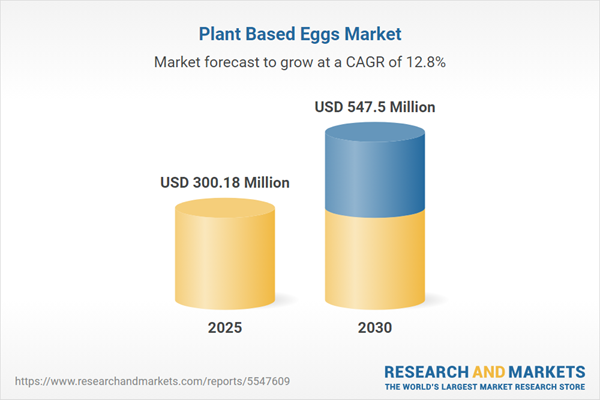The plant-based egg market made from flour and algae protein is expected to encourage growth in the forecast period because of the estimated demand for these products. Algal flour, for example, is high in protein and vitamins, fibrous, and rich in essential amino acids, which makes it analogous to egg nutritional composition. Along with thickeners such as algin and carrageenan, which are also present in algal flour, these chemicals are known as algal chemicals. Algae vegan scrambled eggs are superb in their texture and mouthfeel. One of the primary factors supporting this market's growth is the increasing consumer awareness regarding health and the preference for plant-based eggs. The increasing global population size and requirement-based food also aid the growth.
Plant-based egg market drivers
A rising number of health-conscious consumers are contributing to the market growth
With the rising number of health-conscious consumers, people are resorting to the consumption of vegan eggs more. The high cholesterol levels in normal eggs have been linkedto certain health conditions like heart ailments. A section of the current generation is aware of these problems and islooking for solutions that provide similar benefits but without the added cholesterol. Regular eggs are said to contain a lot of constituents that health-conscious individuals shy away from. Vegan eggs are mostly egg-free, meaning they haveno cholesterol, making them popular among health enthusiasts.Moreover, factors like the rising trend of vitamin and mineral-enriched products are contributing to the rise in the plant-based eggs market. Besides, companies are, in turn, a gear to start selling healthy vegan eggs, adding some extra value. For instance, the Chickpea processing company Shukran Foods, based in Spain, mushroomed as a restaurant supply company dealing in vegan egg substitutes in January 2023.
Plant-based egg market geographical outlook
North America is witnessing exponential growth during the forecast period
The North American market accounted for a significant market share. It is expected to gain a large market share because of the recent increase in the population ofpracticing vegans and the growing trend of food innovations. Besides, the market has witnessed significant growth thanks to innovations and technological developments in the food and beverages industry. The plant-based egg market has reaped the benefits of advanced and rapid technological integration, product launch and distribution, and their swift presence in the market viaphysical and virtual distribution networks. These factors are contributing to the market growth.Reasons for buying this report:
- Insightful Analysis: Gain detailed market insights covering major as well as emerging geographical regions, focusing on customer segments, government policies and socio-economic factors, consumer preferences, industry verticals, other sub-segments.
- Competitive Landscape: Understand the strategic maneuvers employed by key players globally to understand possible market penetration with the correct strategy.
- Market Drivers & Future Trends: Explore the dynamic factors and pivotal market trends and how they will shape up future market developments.
- Actionable Recommendations: Utilize the insights to exercise strategic decision to uncover new business streams and revenues in a dynamic environment.
- Caters to a Wide Audience: Beneficial and cost-effective for startups, research institutions, consultants, SMEs, and large enterprises.
What do businesses use our reports for?
Industry and Market Insights, Opportunity Assessment, Product Demand Forecasting, Market Entry Strategy, Geographical Expansion, Capital Investment Decisions, Regulatory Framework & Implications, New Product Development, Competitive IntelligenceReport Coverage:
- Historical data & forecasts from 2022 to 2030
- Growth Opportunities, Challenges, Supply Chain Outlook, Regulatory Framework, Customer Behaviour, and Trend Analysis
- Competitive Positioning, Strategies, and Market Share Analysis
- Revenue Growth and Forecast Assessment of segments and regions including countries
- Company Profiling (Strategies, Products, Financial Information, and Key Developments among others)
The Plant-based eggs market is segmented and analyzed as follows:
By Source
- Legumes
- Other plant-based sources
By Form
- Liquid
- Powder & Whole-egg
By Distribution Channel
- Offline
- Supermarket
- Convenience Store
- Speciality Store and food service
- Online
By Geography
- North America
- South America
- Europe
- Middle East and Africa
- Asia-Pacific
Table of Contents
Companies Mentioned
- Plantmade
- Zero Egg
- Bob’s Red Mill Natural Foods
- Eat Just, Inc.
- Float Foods
- Crackd
- Orgran
Table Information
| Report Attribute | Details |
|---|---|
| No. of Pages | 143 |
| Published | November 2024 |
| Forecast Period | 2025 - 2030 |
| Estimated Market Value ( USD | $ 300.18 Million |
| Forecasted Market Value ( USD | $ 547.5 Million |
| Compound Annual Growth Rate | 12.7% |
| Regions Covered | Global |
| No. of Companies Mentioned | 7 |









